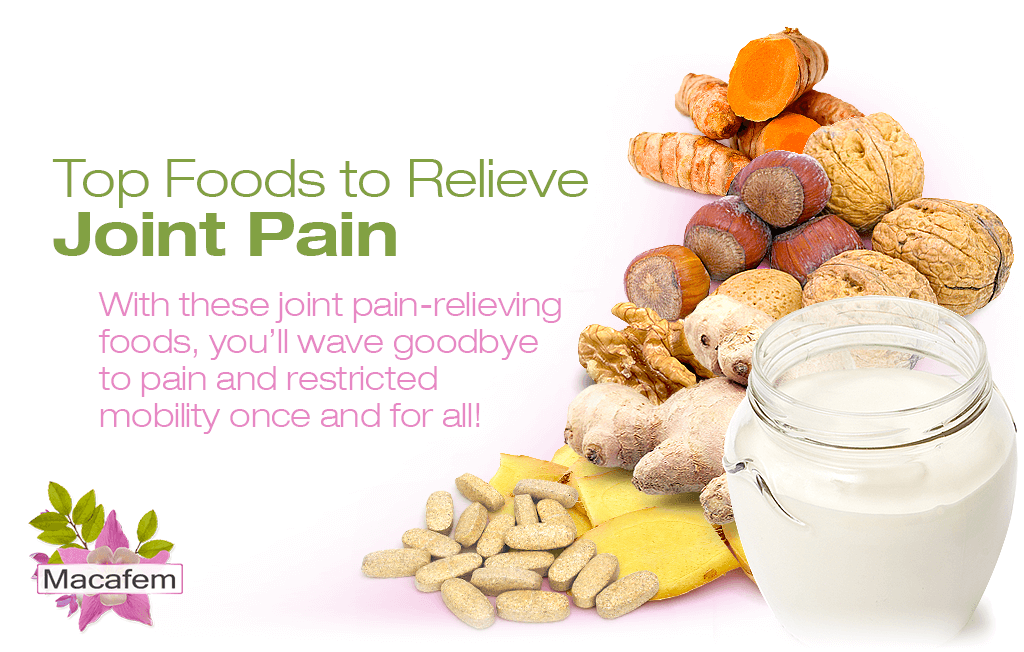Top Foods to Relieve Joint Pain
With things becoming more squeaky and less flexible as we grow older, it may seem that painful joints are an inevitable part of the aging process. But don’t lose your hope just yet. While common, joint pain does not have to rule your mid-life years. With these delicious ideas for joint pain-relieving foods, you will back to feeling like a spring chicken in no time!

Turmeric
Several studies have recently shown that turmeric – more precisely, its active compound called curcumin – is beneficial for managing joint pain due to osteoarthritis. Interestingly, its pain-relieving, anti-inflammatory properties can be enjoyed when curcumin is taken orally as well as applied topically in ointments.
You can start reaping the benefits of curcumin by simply adding turmeric to your meals or to your water. (Pro tip: Consume turmeric alongside black pepper to enhance its medicinal properties.)
Nuts and Seeds
Nuts, seeds, fish, and other foods rich in omega-3 fatty acids are a great weapon against joint pain. These compounds have been shown to have potent, anti-inflammatory properties that may reduce pain and discomforts, especially when caused by rheumatoid arthritis.
There are so many ways to boost your intake of omegas, from snacking on sacha inchi seeds, topping your yogurt with sunflower seeds, starting your day with chia puddings, or enjoying a delicious fish dish for lunch.
Ginger
Without a doubt, ginger is one of the most popular anti-inflammatory and antioxidant foods. So far, research has found that compounds in ginger may reduce the activity of substances – such as leukotrienes – that cause joint inflammation, especially in people with osteoarthritic knee pain.
Ginger’s sharp flavor and aroma can enhance a number of dishes. Try having it in your green smoothies, add it to your vegetable stir fry, use it to flavor your salad dressing, or simply drop a slice in your tea.
Probiotics
A hugely important addition to our diets, probiotics – that is, the good bacteria and yeast – have been credited for offering a wide range of health benefits. While their role in relieving joint pain is not completely understood, experts agree that they may benefit people with inflammatory arthritis.
The best probiotic foods for joint pain include a variety of fermented, plant-based options – like kombucha, kimchi, tempeh, and sauerkraut – or dairy alternatives, like yogurt and kefir.
Additional Help
If your joint pain coincides with menopausal changes, you may enhance your dietary habits with hormone-balancing supplements. And there is nothing better for the job than Macafem!
Macafem contains beneficial alkaloids that help bring hormonal levels to an equilibrium and put an end to symptoms of imbalance, including joint pain. Because its works directly on the body’s endocrine system, it can safely and effectively accompany you throughout your menopausal transition.
Whether it is through reducing inflammation, strengthening body tissues, and improving bone density, the aforementioned foods can help relieve painful joints and preserve your mobility. So, don’t accept joint pain without putting up a fight: Load up on anti-inflammatory foods, grab a bottle of Macafem, and feel better already!
National Center for Complementary and Integrative Health. (2018). Omega-3 Supplements: In Depth. Relieved December 14, 2020 from https://www.nccih.nih.gov/health/omega3-supplements-in-depth
Arthritic Foundation. (n.d.) Probiotics and Arthritis. Relieved December 14, 2020 from https://www.arthritis.org/health-wellness/healthy-living/nutrition/healthy-eating/probiotics-and-arthritis
Gene. (2019). The effect of ginger supplementation on some immunity and inflammation intermediate genes expression in patients with active Rheumatoid Arthritis. Retrieved December 14, 2020 from https://pubmed.ncbi.nlm.nih.gov/30844477/

